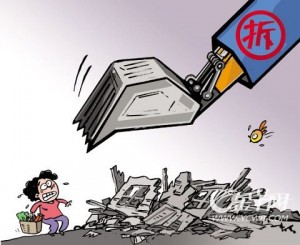Editor’s Note: The Word of the Week comes from China Digital Space’s Grass-Mud Horse Lexicon, a glossary of terms created by Chinese netizens and frequently encountered in online political discussions. These are the words of China’s online “resistance discourse,” used to mock and subvert the official language around censorship and political correctness.
If you are interested in participating in this project by submitting and/or translating terms, please contact the CDT editors at CDT [at] chinadigitaltimes [dot] net.
拆哪 (chāi nǎ) Demolish it; literally “Where to demolish?”

Bulldozer with the character “demolish” written on it depicted as the extension of the bureaucratic arm.
“Chāi nǎ” mimics the sound of the English word “China.” Chāi 拆, “demolish,” has a special meaning in China. Demolitions, often forced on tenants with little or no compensation, are one of the major sources of social instability in China. Developers and the local government profit greatly from forcibly evicting people from their homes to build on the land. Anger over forced demolition lead the people of Wukan, Guangdong to fight the local government, eventually laying siege to their village in December 2011.
Nǎ 哪 means “where” or “which.” Hence, “chāi nǎ” also sounds like the question, “Demolish where?” and mocks the ubiquity of demolition.
All over China, one sees “拆” spray-painted on the sides of buildings slated for demolition. People who have had their homes demolished are called chāiqiānhù 拆迁户.
Victor Mair has a collection of nicknames for China, including chāi nǎ, at Language Log.







